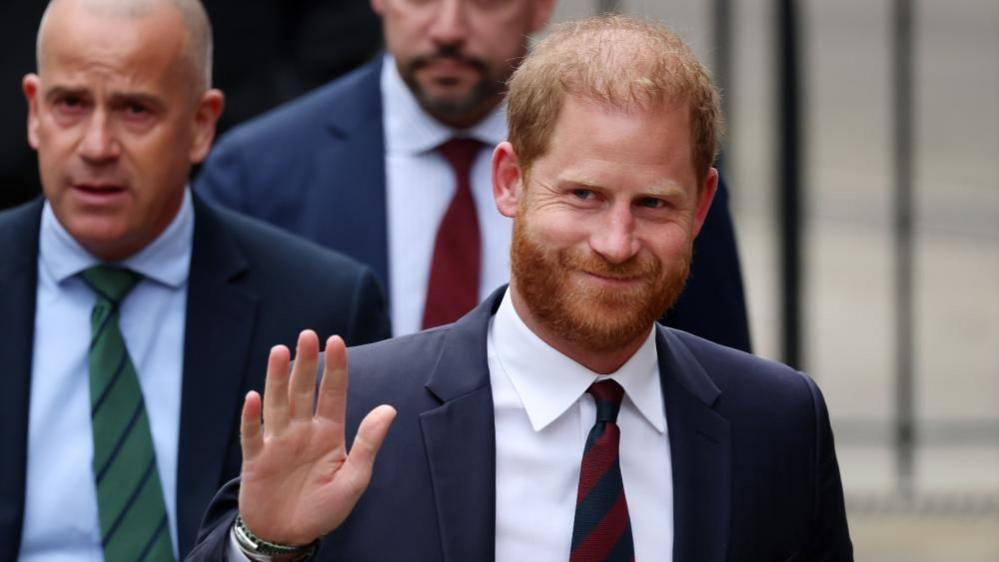Prince Harry loses legal challenge over security
Watch: Sir Geoffrey Vos delivers his judgement at the Court of Appeal
- Published
The Duke of Sussex has lost a legal challenge over the levels of security he and his family are entitled to while in the UK.
Prince Harry had been seeking to overturn a decision that had downgraded his security after he stopped being a working royal and moved to the US with the Duchess of Sussex.
His lawyers had argued that he had been "singled out" for "inferior treatment", but the court ruling upheld that there had been nothing unlawful about how the decision had been reached.
On Friday, a senior judge ruled, external that Prince Harry's "sense of grievance" over how the decision to alter his security was reached did not amount to a basis for a successful appeal.
The dispute between Prince Harry and the government arose after he and Meghan stepped back from frontline royal duties in January 2020 and moved overseas.
Prince Harry has previously said that worries about safety have prevented him from coming to the UK and bringing his wife and children.
This latest legal challenge saw the prince argue in court that the government committee responsible for planning security for the royals did not consider the particulars of his circumstances properly in 2020.
However, three senior judges at the Court of Appeal rejected his appeal.
Sir Geoffrey Vos, the Master of the Rolls, said Prince Harry had made "powerful and moving arguments" and that it was "plain that [he] felt badly treated by the system".
He continued: "But I concluded having studied the detailed documents I could not say the duke's sense of grievance translated into a legal argument for a challenge to Ravec's decision."
Friday's decision means Prince Harry's security will remain outside the automatic, high level of protection which is provided for senior royals.
The judge recognised the argument put forward by Prince Harry's lawyers that his change in status within the Royal Family did not change the level of risk he faced.
But the court did not think there was a sufficient reason to reconsider the decision that had lowered his security.
Harry's long-running legal battle
The roots of Friday's ruling stretch all the way back to Prince Harry's high-profile decision to step back from his role as a senior royal and emigrate with his family.
The prince challenged the decision-making process used by a committee called the Protection of Royalty and Public Figures (Ravec), which authorises security for senior royals on behalf of the Home Office.
Ravec had concluded that because Prince Harry was going to be an infrequent visitor to the UK, his security needs would be assessed on a case by case basis.
But in doing so, Prince Harry's legal team argued that Ravec did not properly re-assess the threats he faced when considering his situation in 2020.
While Prince Harry does still get police protection in the UK, it is not automatic and he has to give plenty of notice of visits - which, he has argued, could expose him and his family to danger.
Prince Harry's latest legal challenge centred on the intricacies of how Sir Richard Mottram, who was then the chair of Ravec, reached the decision to withdraw his protection in 2020.
A previous court hearing ruled that Sir Richard had been entitled not to commission a full review of the prince's security circumstances at the time, which the committee's own policy said he should.
On Friday, Sir Geoffrey accepted that the Ravec chair had failed to follow that policy, but said he did so with good reason because of his and the committee's "unrivalled" experience in royal protection.
It had been "sensible" not to follow the policy, adding: "It was impossible to say that this reasoning was illogical or inappropriate."
- Published8 April

